Another IRGC Cyber Warfare Commander Exposed
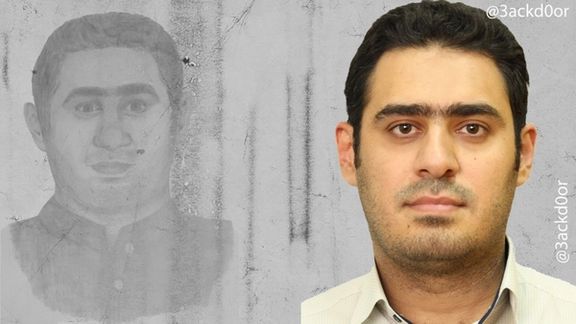
The photo of Reza Salarvand, who leads one of the units of Iran’s Revolutionary Guard’s wing of cyber hackers, has been released to the media.

The photo of Reza Salarvand, who leads one of the units of Iran’s Revolutionary Guard’s wing of cyber hackers, has been released to the media.
Last year, Iran International published a facial composite of Salarvand that was obtained from Lab-Doukhtegan (Sealed Lips) hacktivist group, and the new photo – released for the first time by an account called ‘3ackd0or’ on Tuesday – corroborated his identity.
He is the head of the ‘Intelligence Group 13,’ which is apparently a sub-group within the Shahid Kaveh unit, headed by an IRGC cyber warfare commander, Hamidreza Lashkarian (Lashgarian)
Salarvand’s team was in charge of preparing a database of targets for cyberattacks, including cargo ships, gas stations and maritime control centers in the US and elsewhere.
The 30-year-old with a bachelor’s degree in information technology engineering from the South Branch of Tehran’s Azad University with a lower-than-average grade of 13, according to his BS certificate, which was also released by Lab-Doukhtegan.
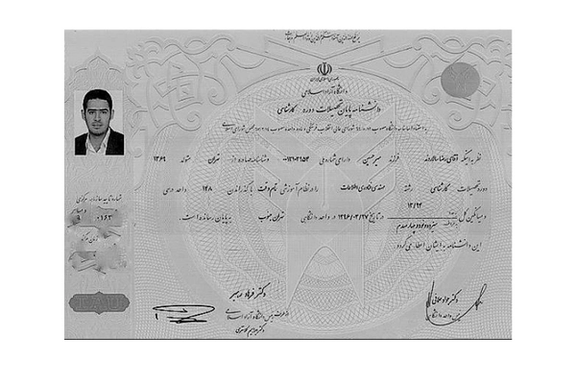
On Monday, Iran International released photos of key Iranian players in global cyberattacks who are affiliated with various government intelligence agencies in Tehran.
Last week, Albania cut diplomatic relations with Iran and expelled its diplomats and immediately its security forces entered the embassy compound looking for evidence.
The United States imposed sanctions on Iran’s intelligence ministry and its minister, with NATO also expressing support for its member state Albania.
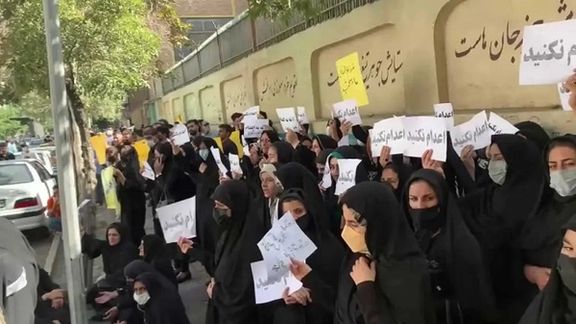
Informed sources told Iran International that Iran's security forces have threatened detained relatives of death row prisoners with prosecution if they protest.
Family members of someprisoners sentenced to death held protest rallies outside the building of the Iranian judiciary for nearly a week but on Saturday and Sunday security forces and plainclothesmen attacked them to end their protest.
At least twenty protesters were arrested, and some were beaten so badly that they had to be taken to hospital for treatment, according to information received by Iran International.
Informed sources say some of the detainees have been forced to sign written pledges promising not to take part in protests and have also been threatened that they will be charged with “assembly and collusion against the regime”, “disturbing public order”, and “insulting top officials” and prosecuted, that can carry long prison terms.
Detainees have also been warned not to speak with foreign-based Persian language media, which authorities always refer to as “hostile media”.
One of the parents of a death row prisoner told Iran International that intelligence agents threatened him with the arrest of his other children and their persecution for participation in the protests although his other children were never involved.
Videos posted on social media last week showed protesters including some children holding placards with words ‘No to Execution’ and ‘No Execution for Drugs’ and chanting ‘Don’t Execute’.
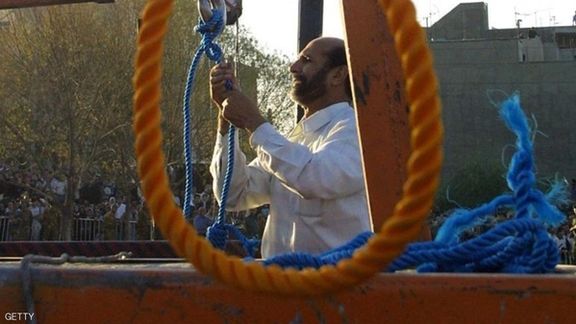
“I stand in solidarity with anguished relatives of death row prisoners in Iran who are protesting bravely to stop the execution of their loved ones. Iran’s authorities must abolish the death penalty, which is the ultimate cruel and inhumane punishment,” Agnes Callamard, secretary general of Amnesty International and former UN Special Rapporteur on Extra-Judicial Executions (2016-2021) tweeted Monday with the Persian hashtags ‘No to Execution’ and ‘Don’t Execute’.
The Islamic Penal Code of 2013 provides for the death penalty for a wide range of offences including murder, drug trafficking, adultery, and homosexuality as well as political crimes.
Most of those executed in Iranian prisons are convicted for drug trafficking or murder but anti-death-penalty activists say the regime uses executions as a political tool of intimidation, especially at times of political crisis.
“There are extensive, vague and arbitrary grounds in Iran for imposing the death sentence, which quickly can turn this punishment into a political tool,” Javaid Rehman, UN Special Rapporteur on the situation of human rights in the Islamic Republic of Iran, told the UN General Assembly in delivering his fourth annual report in July 2020.
“In addition, the structural flaws of the justice system are so deep and at odds with the notion of rule of law that one can barely speak of a justice system,” he said. “The entrenched flaws in law and in the administration of the death penalty in Iran mean that most, if not all, executions are an arbitrary deprivation of life,” Rehman said.
The number of executions has considerably increased in the past few months with most probably hundreds of executions not officially announced.
The US-based HRANA, the news agency of Human Rights Activists, on Monday reported a spate of executions in various prisons across the country in the past few days.
The judiciary this month sentenced two female LGBTQ rights defenders, Elham Chubdar and Zahra Sedighi Hamedani, to death for “promoting homosexuality”.
EU Foreign Policy Chief Josep Borrell’s spokesperson Peter Stano on Tuesday condemned the death sentences passed on LGBTQ activists. "The EU is fundamentally opposed to death penalty at all times and in all circumstances and aims at its universal abolition," he said adding that the EU is also firmly opposed to all forms of criminalization of sexual orientation and gender identity.
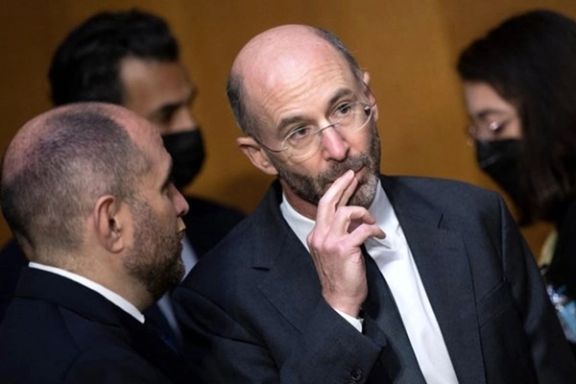
A source close to the US nuclear negotiating team has rejected rumors about Washington’s Special Envoy Robert Malley being sidelined.
The source told Iran International’s correspondent on Tuesday that the rumors are lies and disinformation aimed at undermining diplomacy.
“Mr. Malley will brief members of Congress on the state of Vienna talks at a closed door briefing tomorrow [Wednesday] and will continue his efforts to restore the JCPOA and bring Americans back home,” the source added.
The Times of Israel Monday quoted a “senior Israeli official” travelling with Prime Minister Yair Lapid in Berlin who said talks to revive the 2015 Iran nuclear deal, the Joint Comprehensive Plan of Action, JCPOA, are dead. The official said the Israeli delegation had given “information to the Europeans that proved the Iranians are lying while the talks are still happening.”
The official had also claimed that the talks were “no longer in Malley’s hands,” with the US special envoy shunned aside. The State Department subsequently denied that Malley had eased out or that the US position had “toughened,” the Times of Israel reported.
US Secretary of State Antony Blinken reiterated Monday that it was not possible to give a timeline for the JCPOA talks. US officials, including Malley and Blinken, have said they will continue efforts to revive the 2015 agreement as long as this suits US national interests and has non-proliferation benefits.

Three family members of executed Iranian wrestler Navid Afkari were arrested on Tuesday as they wanted to go to his grave for the second anniversary of his execution.
Navid’s sister Elham Afkari, along with one of the four brothers, Habib, and his wife were arrested by security forces who have blocked roads leading to the grave.
Navid Afkari was arrested along with two of his brothers Habib and Vahid during protests in Iran in 2018 and was executed despite international campaigns to save his life. His other brother Saeed said in August that Vahid has been threatened with death in prison in Shiraz.
Habib Afkari was freed after months of solitary confinement in March, but Vahid is sentenced to 54 years and 6 months in prison and 74 lashes and is held in solitary confinement.
On Tuesday, Saeed confirmed the arrest of his family members and also released an audio recording from one of the hearings of Vahid that proved he was not given a fair trial. He initially received a death sentence for an “act of war against God” for his participation in protests, the authorities later charged him and his brothers with the murder of a government employee.
Amnesty International said in June 2021 that Vahid and Habib were being subjected to torture and other ill-treatment in Adel-Abad prison in Shiraz, and were denied access to adequate healthcare, fresh air, telephone calls and face to face family visits.
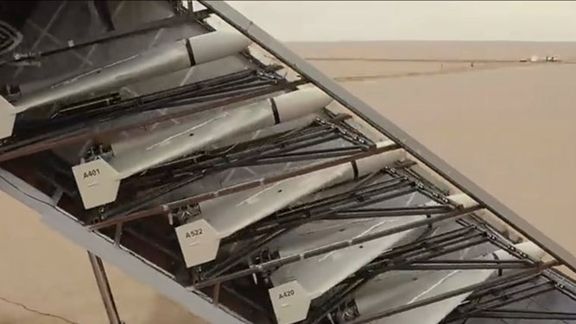
Ukraine's military said Tuesday for the first time that it downed an Iranian-supplied suicide drone used by Russia near Kupiansk amid Kyiv’s offensive through Russian lines in Kharkiv region.
The Ukrainian military’s Strategic Communications Directorate also published several images of the wreckage, which resembled a triangle, or delta-shaped drone flown by Iran known as the Shahed-136, a bomb-carrying drones or “loitering munitions” as experts call them.
In August, US-based think tank Institute for the Study of War quoted advisor to the Ukrainian President’s Office, Oleksiy Arestovych, as saying that Iran handed over 46 drones to Russia and that the Ukrainian government has already noted the use of these drones in combat in Ukraine.
Late in August, Yuliya Leonidivna Klymenko, a member of the liberal party at the Ukrainian parliament, told Iran International that Russia was buying 100 more drones from Iran in addition to the ones it had already bought from the Islamic Republic.
US Defense Department spokesperson Todd Breasseale said August 30 that Russia has faced "numerous failures" with Iranian-made drones, adding that the United States assessed that Russia had received the delivery of Mohajer-6 and Shahed-series unmanned aerial vehicles (UAVs) over several days this month.
On September 8, the United States imposed sanctions on an Iranian company for coordinating transport of Iranian drones to Russia as well as three companies involved in their production.
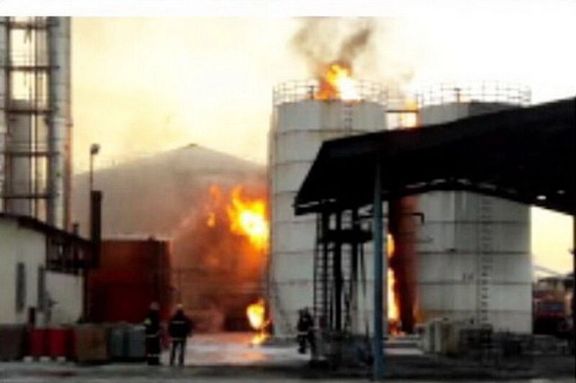
Iran said on Tuesday it brought under control a fire at Shadegan oilfield in southern Khuzestan province caused by an apparent act of sabotage, according to a company official.
Ghobad Nasseri, head of the Maroon Oil and Gas Production Company which exploits Shadegan, told state broadcaster that the fire broke out early on Tuesday after “unknown elements tampered with” one of some 20 active wells.
"The situation is completely under control and there is no cause for concern... The damage is being evaluated but the field will return to production shortly," he added.
The Shadegan field has an estimated total production capacity of about 70,000 barrels per day, according to one source or 110,000 according to another.
Earlier in the month, an explosion rocked Iran’s and Middle East’s oldest oil refinery in southwestern city of Abadan in the oil-rich province, which has been the scene of anti-government unrest in recent months.
This was the second incident at the Abadan refinery, which supplies around 25 percent of the country’s fuel needs, this year. In April, a section of the refinery caught fire but the blaze was contained with no fatalities or injuries.
Several explosions and fires in Iranian military and industrial sites − including pipelines and refineries − since mid-2020 have not been fully explained by authorities. However, they have blamed Israel for a series of spectacular sabotage attacks on nuclear facilities, including two explosions at Natanz uranium enrichment center. Israel has not taken responsibility for any incident.